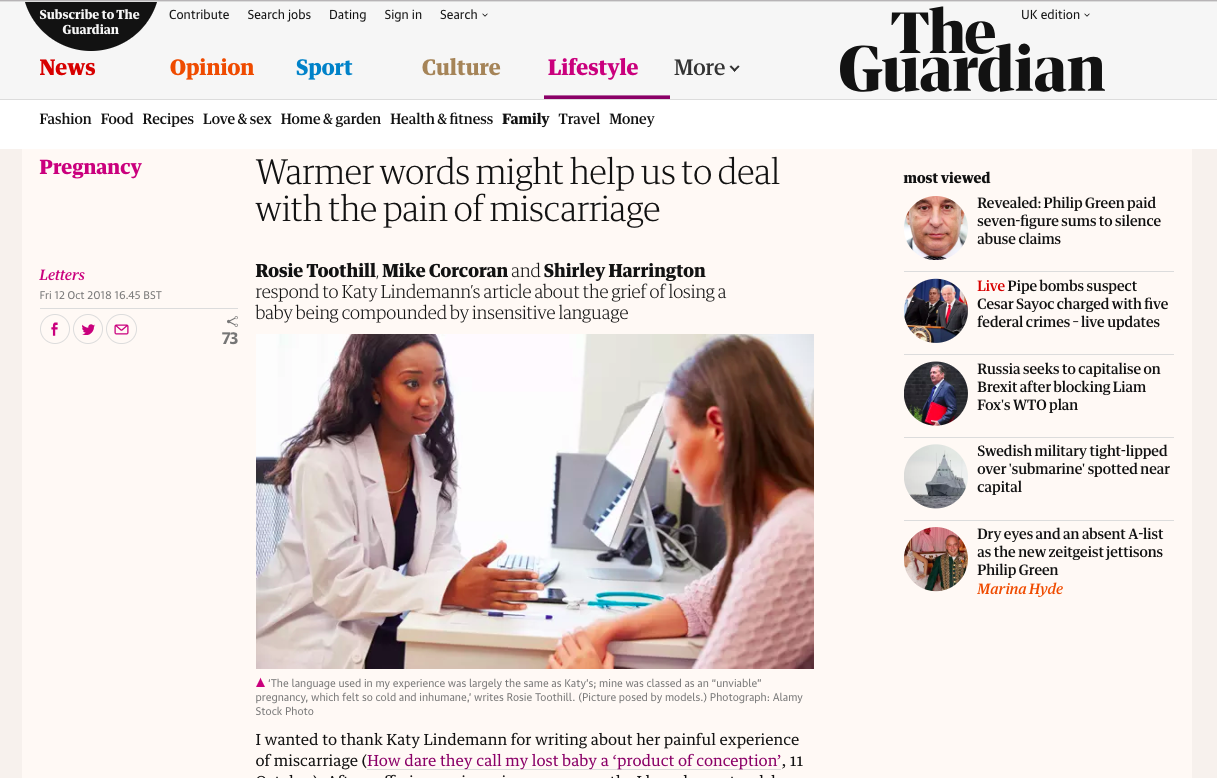Why you don’t have to join the cult of positive thinking when you’re struggling to have a baby
[ Originally posted on Medium ]
Infertility is shit.
It’s really, really shit.
(Spoiler alert: this isn’t going to be crammed with motivational affirmations about infertility. There also will be swearing. Lots. Though you’ve probably already guessed that bit.)
Infertility can be traumatic, heartbreaking, brutal, and utterly unrelenting.
An oft-cited study exploring the psychological impact of infertility found that depression levels in infertility patients were comparable with patients who had been diagnosed with cancer.
Another study found that 4 in 10 women experienced symptoms of PTSD following a miscarriage.
(Anyone who says ‘ The baby making phase was fun!’ clearly never experienced the joys of infertility.)
FUN TIMES!
The cult of positive thinking
Yet whenever people talk about infertility, any meaningful acknowledgement of the deep emotional distress it causes seems utterly conspicuous by its absence.
The only acceptable narrative is one of positivity. Entertaining any negative thoughts is a cardinal sin. Under no circumstances should you allow yourself to get stressed, sad or anxious. You must remain hopeful and optimistic at all times.
Why telling an infertile person that relaxing will help them get pregnant is a monumentally unhelpful thing to say
Mention that you’re suffering from infertility, and you can pretty much guarantee that someone will mention that fabled medical cure of RELAXING.
(If you’re playing infertility bingo, ‘just relax’ is up there as a high scorer, but has just been edged out of the top spot by everyone’s favourite ‘why don’t you just adopt?’)
If you’ve ever experienced infertility, comments like these will be all too familiar:
ThingsPeopleSayToInfertilePeople:
Just relax and it’ll happen.
What we hear:
I’m treating your bona fide medical problem with contempt — and yes I know I wouldn’t dare tell a diabetic/cancer sufferer/person with one arm to just relax, but for some reason I think that will fix YOUR medical problem quite easily.
ThingsPeopleSayToInfertilePeople:
My cousin’s secretary’s sister’s boyfriend’s neighbour and his wife had been trying for 17 years, and had 300 rounds of IVF, and she had blocked tubes, and he had one bollock and a low sperm count, and they were told she’d never get pregnant — so they gave up trying, and went on the adoption list, and went on holiday, and relaxed, and got drunk, and OMG she got pregnant naturally with quadruplets. Never give up!
What we hear:
I have no idea what I’m talking about medically, but I’ll advise you anyway, and spout spurious examples of unrelated cases just because it’s the only story I know. I also think your decision not to continue with ridiculous heart-wrenching and expensive treatments means you obviously don’t want it/aren’t trying hard enough. Shame on you.
ThingsPeopleSayToInfertilePeople:
Maybe you should take a break — I bet if you just relax, it’s bound to happen. It happened to me. We’d been trying to conceive for 6 months with no luck — then we went on holiday and forgot all about it — and BAM, I fell pregnant. It’ll happen for you when the time is right, I know it will.
What we hear:
My 6 months of not-getting-pregnant-from-some-sex is exactly the same as your years of infertility and multiple rounds of physically, emotionally and financially harrowing fertility treatment. I think that you’re trying too hard, and that all this stress is what’s preventing you from getting pregnant. Surely if it’s not happened by now, even with all this intervention, you must be doing something wrong.
Public Service Announcement: Infertility is classified by the WHO as a ‘disease of the reproductive organs’.
Causes for which include issues like PCOS, endometriosis or fibroids, polyps, blocked fallopian tubes, congenital uterine malformations, pelvic adhesions, high levels of uterine natural killer cells, various autoimmune issues, sperm defects (incl. count, motility, morphology or DNA fragmentation), and chromosomal problems such as balanced translocations (amongst numerous others).
Which, apparently, can all be addressed by the incredible power of positive thinking.
(Curiously, you don’t tend to hear relaxation suggested as a miracle cure for diseases like cystic fibrosis, motor neurone disease, or cancer.)
In my own case, given we’ve tried 4 IVF cycles (& 7 cancelled cycles); pre-implantation genetic screening; a wealth of weird, wonderful, painful (and expensive) investigations; thousands and thousands of £££ on medications via every conceivable route of administration (pills, patches, pessaries, suppositories, subcutaneous injections, intramuscular injections, intravenous drips and intrauterine infusions, to be precise); 2 hysteroscopies, plus the opinions of the best fertility specialists on both sides of the Atlantic (and still no baby)…
…at a guess, I suspect your expert fertility treatment plan of ‘going on holiday & getting pissed’ (whilst no doubt enjoyable) PROBABLY ISN’T GOING TO FIX MY BROKEN WOMB LINING, AND OVERCOME THE FACT I WILL NEVER BE ABLE TO CARRY A CHILD.
(Also, I’ve already tried holidays and getting rat-arsed drunk. Oddly enough, I’m still barren.)
Why it’s even more insidious when clinicians tell you to relax
It’s one thing when ‘well-intentioned-but-desperately-unhelpful’ friends — who don’t know any better — tell you that the reason you’re not getting pregnant is because you’re stressed. But it’s downright cruel when fertility clinics promote the notion that ‘if you’re not thinking positively then you’re decreasing your chances of success’ (the implication being that if treatment fails, you’ve only got yourself to blame).
One leading London fertility clinic states on their website:
There’s no question about it: Your emotional health may on some level affect your ability to conceive. Our thoughts and the way we think determine our emotional and physical state. I feel that negativity and negative thoughts can, at some level, act as a block when trying for a baby.
Another UK clinic advises that:
Positive thinking can be a very powerful tool when it comes to improving your chances of the IVF process resulting in conception.
Stress and anger however, can have a counterproductive effect on IVF treatment, so it’s in your best interests to relieve yourself of these emotions.
Stress has a direct relationship with a woman’s menstrual cycle and the fertility process and may affect your chances of a successful IVF treatment.
A clinic in the Middle East (on a page ambitiously titled “The Power Of Positivity: Believe You Can And You Will!”) counsels against even talking about your fears & doubts:
Surround yourself with people who can listen to you and your journey that have more of a positive approach and avoid discussing the subject with those who make you feel negative.
So, if you’re not already feeling utterly distraught about the entire, soul-destroying process and the relentless failure, now you can beat yourself up about the fact that even the Drs reckon it might be your fault that you’re not getting pregnant — because you’re not being sufficiently cheery and optimistic.
Fertility clinics are a part of a multi-million pound industry, profiting from the delivery of medical treatments to treat physical conditions — treatments which are anything but relaxing. If clinics genuinely believed that stress had a meaningful effect on success rates, they’d be flogging relaxation therapies as a core part of treatment protocols. They’d be prioritising fertility counselling as a critical stage of any IVF cycle — instead of a token afterthought, paying lip service to the HFEA code of practice requiring all UK clinics to provide patients with (optional) access to counselling.
Much better instead to push the positivity agenda (and the blame) back onto the patient. A buy-one-get-one-free special bonus offer on guilt — giving you the chance to feel like a double failure! You thought a problem with your body was the reason you couldn’t have a baby? Well now it turns out the problem’s also with your mind! When you’re picking yourself up off the floor after another failed cycle, desperately looking for answers — perhaps instead of questioning whether the clinic could have done anything differently, maybe you’re to blame? Maybe you sabotaged your chances of success, because you were so fearful and anxious of yet more failure?
Why you don’t need to stress about being stressed
The BMJ (one of the world’s oldest and most well respected medical journals) conducted a broad meta-analysis of the extant research into the thorny question of whether poor psychological wellbeing impacts on fertility outcomes. The paper’s authors concluded that the evidence demonstrated that this theory is — to use the appropriate technical lingo — UTTER BOLLOCKS.
Yep. The snappily-named “Emotional distress in infertile women and failure of assisted reproductive technologies: meta-analysis of prospective psychosocial studies” gathered data from 14 separate studies, which followed over 3,500 women undergoing fertility treatment. It concluded that:
The findings of this meta-analysis should reassure women and doctors that emotional distress caused by fertility problems or other life events co-occurring with treatment will not compromise the chance of becoming pregnant.
See that? Emotional distress will not compromise the chance of becoming pregnant.
Suck on that, positivity vultures!
No doubt the Daily Mail will continue to gleefully run stories like ‘Stress can double the risk of infertility for women’ (unsurprisingly opting for a sensational headline that contradicts the study’s actual findings— helpfully summarised by the NHS here: Study fails to prove effects of stress on fertility)
Perhaps in the future more conclusive evidence will determine that there is in fact a clear causal link between anxiety and infertility outcomes. Maybe we doall need to jump on the positivity bandwagon to have any chance of having a baby.
But for now, Dr Jacky Boivin — who authored the BMJ paper above — advises:
If people are thinking of using some kind of intervention [to treat stress] — and you can go on the Internet and find a million things claiming they’ll get you pregnant — they should be motivated to use them to improve their quality of life rather than to increase their pregnancy rates.
Why it’s OK to reject the cult of positivity
Stress may not cause infertility, but infertility definitely causes stress.
And for many of us, rather than alleviating this anxiety, the tyranny of positivity can make it much, much worse.
I did a shedload of mind-body therapies, all recommended by the top fertility gurus as vital stress-busting techniques to improve one’s chances of success.
These included: fertility acupuncture, positive affirmations, hypnofertility, fertility reflexology, visualisation and guided imagery, specialist meditation for infertility, Mayan abdominal massage, mindfulness colouring books and gratitude lists (amongst others).
Did I find them enjoyable and relaxing? No.
Did I get frustrated that I was supposed to be feeling relaxed, but didn’t? Yes.
Did I feel anxious that I wasn’t ‘doing them right’, because apparently they worked for everyone else? Yes.
Did I feel anxious about feeling anxious, because that negated the whole point of doing all this in the first place? Yes.
Did I resent them as a colossal waste of money? Yes.
Did I ever at any point honestly believe that they would have any impact whatsoever on the outcome of my treatment? No.
I’m a massive cynic. I consider myself a (broadly) rational person. I don’t give much credence to ‘alternative’ medicine. I’m the sort of person who rails against homeopathy, and urges people to read books like Bad Science to understand the importance of evidence-based medicine.
But despite all of this, against my better nature, I did ALL THIS FERTILITY WOO ANYWAY. Because I felt guilty that if I didn’t try hard enough to become a super-chilled, mega-Zen, über-positive, gold star ‘ray of sunshine’ infertile, that it would be my fault if (when) the treatment failed.
The cult of positivity became a stick with which to beat myself.
A positive outlook can be really, really valuable for your overall mental wellbeing. But it’s not a miracle panacea for getting (& staying) pregnant.
Personally, I wish I’d focused more on radical self-care, and less on worshipping at the altar of positivity.
What actually helped me most of all was finding my tribe. Women who were going through the same experience, who understood exactly how I felt. Who shared my exasperation with the whole Pollyanna masquerade. Who acknowledged how unbelievably shit it was, and didn’t offer sentimental platitudes. Who listened without judgement .Who offered empathy, sardonic laughter, sisterhood and support. Who made me feel less alone.
There is no right or wrong way to ‘do’ infertility. Just do whatever you need to do to survive.





















